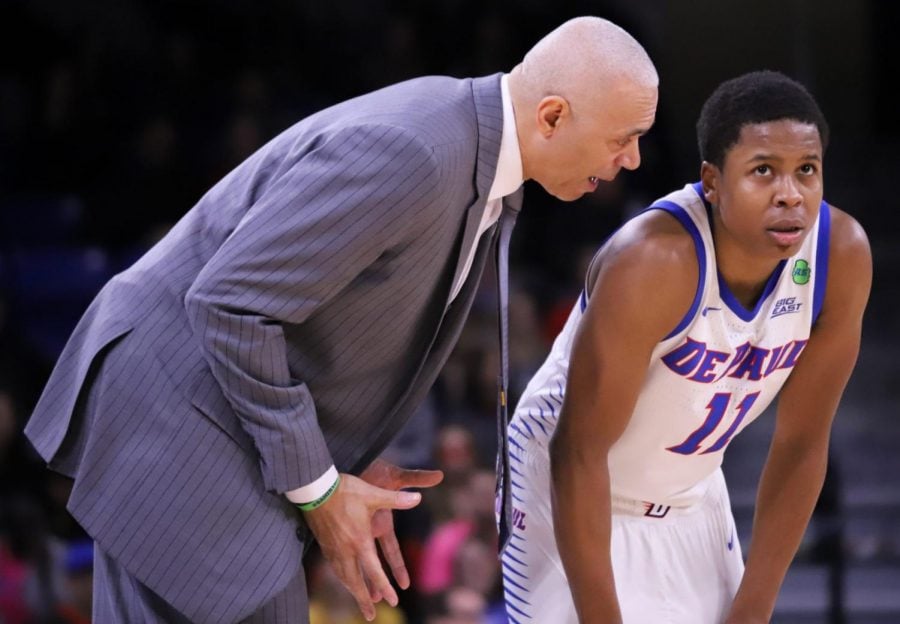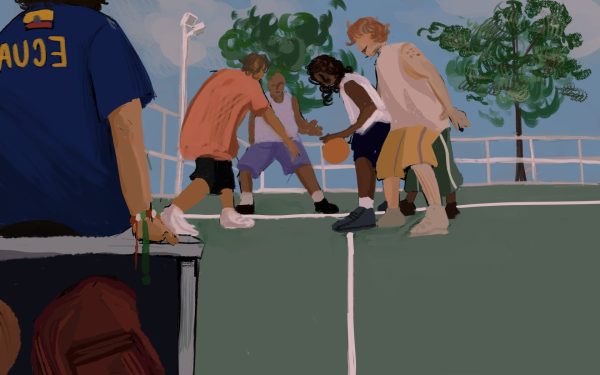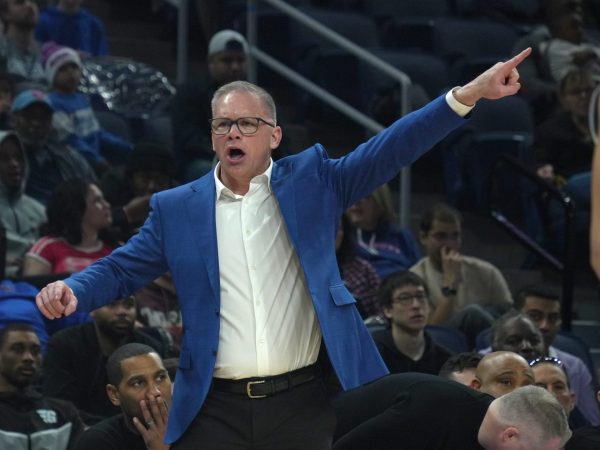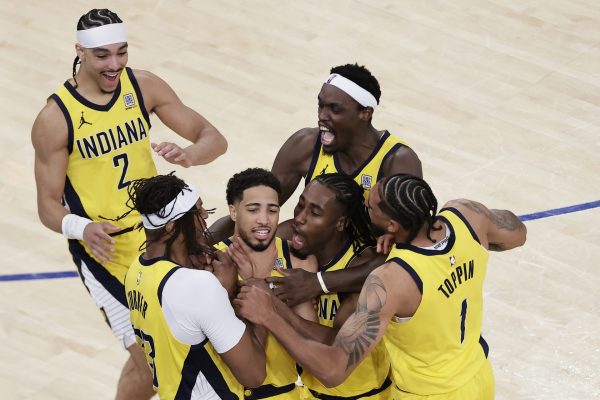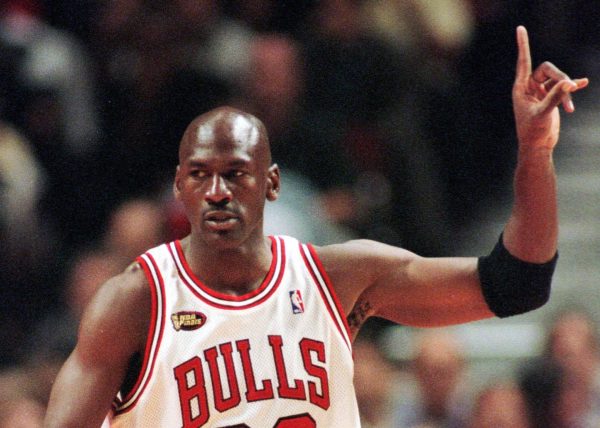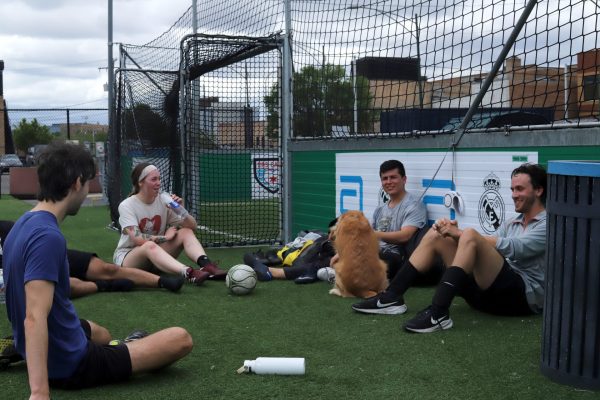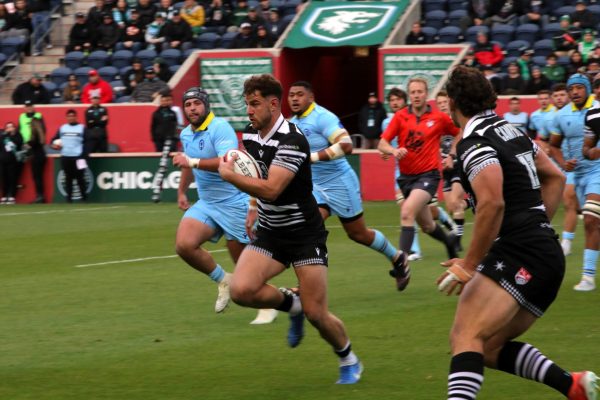Dave Leitao reflects on George Floyd, protests, racism in America
Alexa Sandler | The DePaulia for The DePaulia
DePaul head coach Dave Leitao talks to junior guard Charlie Moore during the Blue Demons’ 74-68 win over Georgetown on Feb. 22.
In the last couple of months, there hasn’t been as much basketball talk during DePaul’s team meetings. But that doesn’t mean the team hasn’t used this opportunity to focus on other more pressing topics around the U.S.
They have.
On Sunday, DePaul men’s basketball head coach Dave Leitao held a zoom meeting with his team to have discussions regarding the death of George Floyd in the custody of a Minneapolis police officer, the following protests that have taken place and the continuing issue of racism in the country.
“The first thing that people may or may not understand is that the role of any coach, collegiately, means by percentage you spend very little time talking about the specifics of basketball,” Leitao said during a phone interview with The DePaulia. “There’s so many other things, academically and otherwise, that you are involved in and your relationship with. So, especially because we don’t have basketball to talk about together on a day-to-day basis, we have been talking about a lot of different things.
“This obviously comes to the forefront because it’s so emotional,” Leitao said. “And as a young person, you are not maybe at the point where you can deal with your emotions properly, you are angry, you are confused, you are hurt, you are a lot of different things. So, it’s important for me to kind of try to tap into those adverse emotions and give some clarity, not to the situation, but how they deal with it. And that’s what I will try to do until we get to a point where there is better understanding, not just from mine team, but from everybody.”
In the last week, DePaul freshman forward Romeo Weems has been one of the more vocal players on the roster to speak out against police brutality. But other players have also posted on their respective social media accounts, anger with the killing of Floyd.
Weems tweeted on May 30 “STOP KILLING US.” While Weems has used his social media platform to make sure his voice is heard, Leitao says that not everyone has to speak out to show their frustration with issues in America.
“It’s sensitive a little bit because, especially with social media, being able to speak out, and in Romeo’s case, express his outrage and his emotion for it,” Leitao said. “But speaking out isn’t always for any individual. The best way to do it, you can remain silent and be even more outraged than someone who is speaking out. So, my advice is to handle it, emotionally or otherwise, in the way you feel most comfortable and it’s my job to support you in that — as long as you do it in its proper way.
“Social media can be used as a real positive or, as we have seen, a negative. So, you have to be careful before you press send. You want people when they read what you say to nod in agreement, opposed to shake their head in disagreement. It doesn’t mean what you say is not impactful, sometimes it’s how you say it, it’s the language you use when you are expressing yourself.”
Throughout social media, however, Leitao admits that it does empower the youth to have their voice heard. Instead of keeping their emotions and opinions to themselves, the younger generation is now able to publicly express their feelings about issues they care about.
In this most recent case, people have been able to showcase their frustration with police brutality and the inequalities that exist between white and black people in America by protesting. Cities across the country have seen protests take place in the week that have called for justice and reform in policing. Some cities have also seen some protests turn into violent demonstrations, with looting and rioting taking place in several areas.
“The connection between those individuals that are independent as to where they are geographically and to come together through social media, is a very, very important and powerful tool that the generation I come from was not afforded,” Leitao said. “You see this across the country, across the world, where planned protests and things that really matter are a galvanizing force. And hopefully it ends up having a positive effect in change because the masses are speaking, and the masses have social media as an outlet to get together.”
DePaul University has also posted its own statement regarding the recent events taking place in the country, with the school saying they stand against racism, violence and hate.
“DePaul University stands together in solidarity with our students, faculty, staff and alumni against racism, violence and hate,” the statement reads.
In the last week, the police officer, Derek Chauvin, who was seen in the video having his knee on Floyd’s neck for over eight minutes has been fired and arrested. The Minnesota Attorney General, Keith Ellison, has since upgraded the charges against Chauvin to second-degree murder. Ellison has also charged three other officers, J. Alexander Kueng, Thomas K. Lane and Tou Thao, with aiding and abetting second-degree murder.
According to Leitao, the next step in delivering justice goes beyond eradicating police brutality, but changing a system that has been constantly unfair to minority groups.
“We live in a society that we have all bought into a set of rules and regulations that would help us pursue the American dream,” Leitao said. “But when those rules and regulations in our society are broken, then you lose some sense and faith in this process. The acting out, whether it’s the outrage or the protest, is your voice to say this society that you got me bought into, pursuit of life, liberty and happiness, is not doing that for me. So, that becomes an even bigger challenge because systemic racism is not just police brutality, it’s a system that has continually been unfair to the oppressed and disenfranchised.
“It’s a larger part of the conversation to answer the question to how to fix it because, yes, we would really love to eradicate police brutality, but that doesn’t mean we are going to eradicate miseducation or disproportionate treatment of people of color, gender, LGBTQ community, all things that people feel like they don’t have a fair shot in a society we have bought into. So, it’s part of a larger conversation for the future.”


